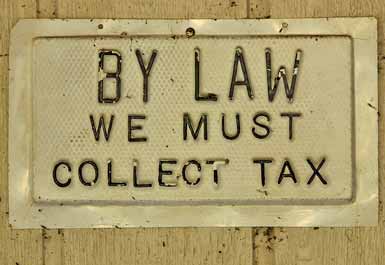
California Internet tax bill breakdown by Stephanie Robogeisha (CC BY-NC-SA 2.0) https://flic.kr/p/9YoqbP
Digital Tax
The Law Bytes Podcast, Episode 239: The Rise and Fall of Canada’s Digital Services Tax
Two days after U.S. President Donald Trump threatened to suspend all trade negotiations with Canada unless it rescinded the digital services tax, Canadian Finance Minister François-Philippe Champagne announced that the government was rescinding the tax. The rise and fall of the Canadian DST was marked by repeated warnings of potential U.S. retaliation, the Canadian government’s dismissal of the risks, and no shortage of confusion about the tax itself.
There have been multiple Law Bytes podcast episodes on the DST over the years, but this episode takes stock of its rise and fall. The episode examines what the DST is, what just happened, and what it means for the future of digital policy in Canada.
Canada’s DST Debacle a Case Study of Digital Strategy Trouble
My Globe and Mail op-ed opens by noting that after years of dismissing the warnings of likely retaliation, the Canadian government caved to U.S. pressure earlier this week as it cancelled the digital services tax. Faced with the U.S. suspension of trade negotiations, Finance Minister François-Philippe Champagne announced that the government would rescind the legislation that created it.
Canadian Government Caves on Digital Services Tax After Years of Dismissing the Risks of Trade Retaliation
After years of dismissing the warnings of likely retaliation, the Canadian government caved last night on the digital services tax. Faced with the prospect of the U.S. suspending trade negotiations, Finance Minister François-Philippe Champagne announced that the government would drop the DST altogether, payments scheduled for Monday would be cancelled, and legislation will be forthcoming to rescind the legislation that created it in the first place. Over the weekend, I wrote about the repeated warnings that the DST was a serious trade irritant with the U.S. that cut across party and presidential lines. While ignoring the risks was bad enough, I argued that Canada played its DST card too early. Rather than delaying implementation in the hopes of incorporating it into a broader trade deal with U.S., it marched ahead, leading to an entirely predictable response from U.S. President Donald Trump. That left Canada in a no-win situation: stick with the DST but face the prospect of higher tariffs or embarrassingly drop the DST (and $7.2 billion in revenue over five years) with only restarting negotiations that were on until government overplayed its hand to show for it.
Ignoring the Warning Signs: Why Did the Canadian Government Dismiss the Trade Risks of a Digital Services Tax?
U.S. President Donald Trump announced yesterday that he was suspending trade negotiations with Canada due to the imminent implementation of the digital services tax (DST). The result could be increased tariffs on Canadian products and a stalemate on many of the current trade battles between the two countries. This result should not come as a surprise. Indeed, the prospect of a trade war over the DST has been readily apparent for years. In my Law Bytes podcast episode in May on Canadian digital policy under Prime Minister Mark Carney, it was the top short term issue (I did not anticipate burying lawful access in a border bill).
Just prior to Trump’s inauguration in January, I wrote:
Why Years of Canadian Digital Policy Is Either Dead (Prorogation) or Likely to Die (Trump)
The Canadian political and business communities are unsurprisingly focused on the prospect of U.S. President Donald Trump instituting 25% tariffs on Canadian goods and services. The threat of tariffs, which could spark a retaliatory response by Canada and fuel a damaging trade war, would likely cause serious harm to the Canadian economy. But tariffs aren’t the only story arising from new Trump actions in his first day in office. Amidst the many executive orders signed on day one are several with significant implications for Canadian law, particularly Canadian digital policies such as the digital services tax, mandated streaming payments arising from Bill C-11, and mandated payments for news links due to Bill C-18. When combined the government’s decision to prorogue Parliament earlier this month, the results of years of Canadian digital laws and policies now largely fall into two groups: those that have died due to prorogation and those that are likely to die due to Donald Trump.











